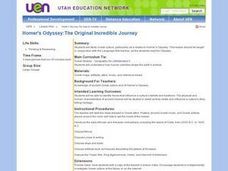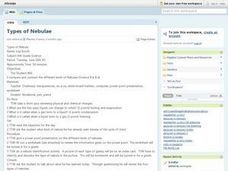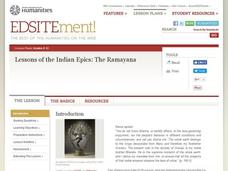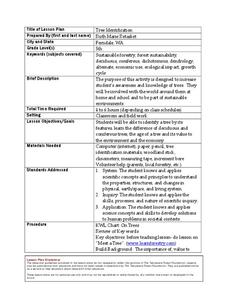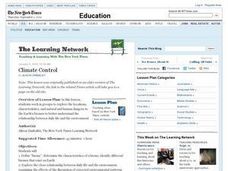Curated OER
As the Sun Burns
Students examine the types of light the sun gives the Earth. They describe the electro-magnetic spectrum and how to protect themselves from different types of light. They identify the layers of the atmosphere as well.
Orange County Department of Education
Dancing Rainbows: A Pueblo Boy's Story
Third graders identify the main ideas illustrated in the story "Dancing Rainbows." They identify details from the story that show respect toward self and others. Students write a paragraph to illustrate how the Tewa Indians show respect....
Curated OER
Oil Spill
Fourth graders watch a video about the types of products made from oil or oil used as energy to produce the product. In groups, they identify the positive and negative aspects of oil and participate in various activities. They use the...
Curated OER
Solstice and Equinox
Students identify the dates of the solstices and equinoxes and how they relate to the various seasons on Earth. After discussing how the solstice and equinox affect the seasons, students use their bodies to demonstrate the how each...
Curated OER
Hazardous Products Substitutes
Students investigate toxic substances. In this health lesson plan, students identify warning labels on common household cleaners and create a "less toxic" cleaning recipe book. Students recite a pledge to try a less toxic substitute at...
Curated OER
The Planets in Our Solar System
Students gain knowledge about earth and space science by studying the nine planets in the solar system as well as their key characteristics. In this solar system lesson plan, students identify the nine planets. Students work in groups to...
Curated OER
Because We Can, Should We?
Students identify a position on an issue of geographic importance and support it They read the story "By the Waters of Babylon," and write a paragraph explaining what they think the relationship between Babylon and the Biblical referene...
Curated OER
Continents and Oceans
Students identify oceans and continents and their locations on a map. They color-code and label their own map of the world's continents and oceans. They play the game Continents and Oceans to identify specific areas.
Curated OER
Modeling Plate Tectonics
Students investigate the four different ways tectonic plates interact at their boundaries. Using simple available materials, they create models to simulate these interactions present at plate boundaries.
Curated OER
Energy/Light/Heat/Sound
Fourth graders study the properties of heat in this series of lessons. They discuss sources of heat and experiment to determine its properties. They identify insulators and conductors by measuring temperatures, and graphing their data....
Curated OER
Science: Avalanche!
Eighth graders examine avalanches after reading excerpts from John Muir's book, "The Yosemite." In small groups, they conduct experiments with flour, sugar, and potato flakes representing different snow consistencies. Then, 8th graders...
Curated OER
What is the Composition of Soil?
Young scholars examine the different components that make up soil. Using data, they identify the components of soil in their local area and discover how scientists use the soil to see how it was formed. They also describe the soil...
Curated OER
Homer's Odyssey:The Original Incredible Journey
Young scholars study Greek culture, particularly as it relates to Homer's Odyssey. They examine how human activities shape the earth's surface and identify forces that influence a culture's beliefs and traditions. They determine that...
Curated OER
Types Of Nebulae
Eighth graders explore the different types of nebulae that can be found in the solar system. They view a PowerPoint presentation about the material and identify each nebulae as it is presented. Students also discuss the life cycle of a...
Curated OER
Getting to Know Some of Pennsylvania's Fishes
Students research and identify the fish of Pennsylvania. For this earth science lesson, students view ten photos of fish and identify the characteristics of each fish. Students record observations and practice naming the fish using their...
Curated OER
Lessons of the Indian Epics: The Ramayana
Students read a version of Ramayana and explore the elements of the epic hero cycle. For this Ramayana analysis lesson, students retell the basic narrative of the Ramayana and identify the main characters. Students identify elements of...
Curated OER
Tree Identification
Students list four ways to identify trees. In this tree identification instructional activity, students use tree identification techniques such as leafs, bark, wood grain, soil type, and climate to create tables and graphs.
Curated OER
Conductivity of salt Solutions
Students investigate the concentration level of solutions. In this math/science lesson, students identify three different ionic compounds. They predict the conductivity of each using their collected data.
Curated OER
Plants and Animals: Partners in Pollination
Students identify the plant parts and bee structures that are involved in pollination. They simulate pollination in a group activity and process the information.
Curated OER
Climate Control
Learners explore the locations, characteristics, and natural and human dangers to the Earth's biomes to better explain the relationship between daily life and the environment.
Curated OER
Finding an Earthquake's Epicenter
High schoolers examine the process used to identify the epicenter of an earthquake. They identify the Richter scale and interpret a seismograph reading. They also view photographs of the aftermath of earthquakes.
Curated OER
Ocean Currents
Fourth graders work in groups to research ocean currents and create posters with their findings. They locate the patterns and names of major ocean currents and identify them on a map. Students also use red pencil to show ocean currents...
Curated OER
Solar System Slide Show
Students work in small groups to research a planet in our Solar System in order to compare it to Earth. They examine the planet's size, atmosphere, rotation and revolution periods, temperature, and other attributes. They collect...
Curated OER
Maps! Maps! Maps!
Third graders examine and identify different types of maps. They review the types of projections and which maps are better for different information. They answer comprehension questions at the end of the lesson plan.














